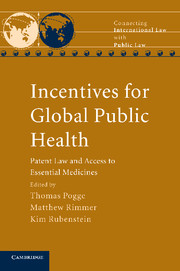Introduction: Access to essential medicines: public health and international law
Published online by Cambridge University Press: 04 August 2010
Summary
Prologue
Historically, there have been intense conflicts over the ownership and exploitation of pharmaceutical drugs and diagnostic tests dealing with infectious diseases.
Throughout the 1980s, there was much scientific, legal and ethical debate about which scientific group should be credited with the discovery of the human immunodeficiency virus and the invention of the blood test devised to detect antibodies to the virus. In May 1983, Luc Montagnier, Françoise Barré-Sinoussi and other French scientists from the Institut Pasteur in Paris published a paper in Science, detailing the discovery of a virus called lymphadenopathy (‘LAV’). A scientific rival, Robert Gallo of the National Cancer Institute, identified the AIDS virus and published his findings in the May 1984 issue of Science. In May 1985, the United States Patent and Trademark Office awarded the American patent for the AIDS blood test to Gallo and the Department of Health and Human Services. In December 1985, the Institut Pasteur sued the Department of Health and Human Services, contending that the French were the first to identify the AIDS virus and to invent the antibody test, and that the American test was dependent upon the French research.
In March 1987, an agreement was brokered by President Ronald Reagan and French Prime Minister Jacques Chirac, which resulted in the Department of Health and Human Services and the Institut Pasteur sharing the patent rights to the blood test for AIDS. In 1992, the Federal Office of Research Integrity found that Gallo had committed scientific misconduct, by falsely reporting facts in his 1984 scientific paper.
- Type
- Chapter
- Information
- Incentives for Global Public HealthPatent Law and Access to Essential Medicines, pp. 1 - 32Publisher: Cambridge University PressPrint publication year: 2010
- 6
- Cited by



